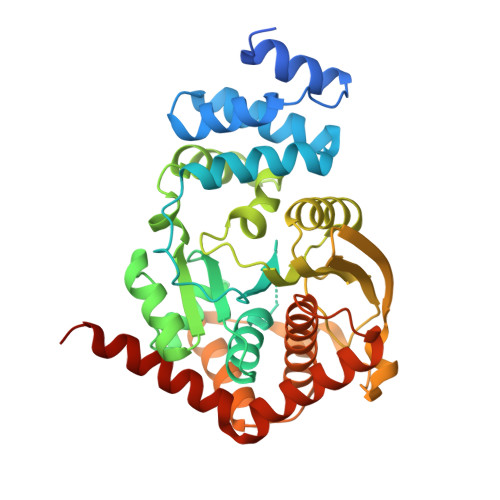Alternative substrates reveal catalytic cycle and key binding events in the reaction catalysed by anthranilate phosphoribosyltransferase from Mycobacterium tuberculosis.
Cookson, T.V., Castell, A., Bulloch, E.M., Evans, G.L., Short, F.L., Baker, E.N., Lott, J.S., Parker, E.J.(2014) Biochem J 461: 87-98
- PubMed: 24712732
- DOI: https://doi.org/10.1042/BJ20140209
- Primary Citation of Related Structures:
4N5V, 4N8Q, 4N93, 4OWM, 4OWN, 4OWO, 4OWQ, 4OWS, 4OWU, 4OWV - PubMed Abstract:
AnPRT (anthranilate phosphoribosyltransferase), required for the biosynthesis of tryptophan, is essential for the virulence of Mycobacterium tuberculosis (Mtb). AnPRT catalyses the Mg2+-dependent transfer of a phosphoribosyl group from PRPP (5'-phosphoribosyl-1'-pyrophosphate) to anthranilate to form PRA (5'-phosphoribosyl anthranilate). Mtb-AnPRT was shown to catalyse a sequential reaction and significant substrate inhibition by anthranilate was observed. Antimycobacterial fluoroanthranilates and methyl-substituted analogues were shown to act as alternative substrates for Mtb-AnPRT, producing the corresponding substituted PRA products. Structures of the enzyme complexed with anthranilate analogues reveal two distinct binding sites for anthranilate. One site is located over 8 Å (1 Å=0.1 nm) from PRPP at the entrance to a tunnel leading to the active site, whereas in the second, inner, site anthranilate is adjacent to PRPP, in a catalytically relevant position. Soaking the analogues for variable periods of time provides evidence for anthranilate located at transient positions during transfer from the outer site to the inner catalytic site. PRPP and Mg2+ binding have been shown to be associated with the rearrangement of two flexible loops, which is required to complete the inner anthranilate-binding site. It is proposed that anthranilate first binds to the outer site, providing an unusual mechanism for substrate capture and efficient transfer to the catalytic site following the binding of PRPP.
- *Maurice Wilkins Centre for Molecular Biodiscovery, Biomolecular Interaction Centre and Department of Chemistry, University of Canterbury, 20 Kirkwood Avenue, Christchurch 8140, New Zealand.
Organizational Affiliation:



















